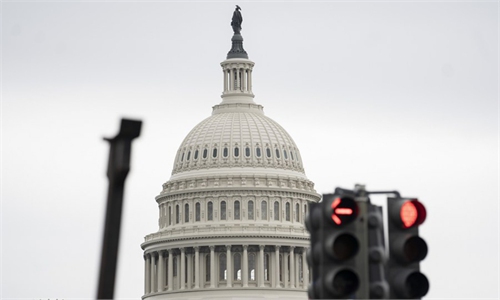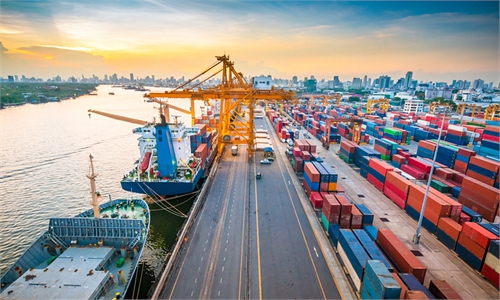
File photo: VCG
Notorious China doomsayer Gordon Chang on Tuesday wrote on Twitter, "Americans, for the first time in their lives, are seeing empty shelves in the stores. This isn't right. We need to cut #China out of our supply chains by producing locally." Indeed, this isn't right: While people living in the strongest economy in the world have to face empty shelves in the stores, some so-called "China hands" are still trying to blame China for it. Some joke if Chang has any interest in predicting whether these empty shelves epitomize the coming collapse of the West.Recently, due to the debt crisis of Chinese real estate giant Evergrande, many Western media outlets and observers have again started to wonder, "if China's economy or financial system will tip over too." Such speculation is regarded as alarmist, even in the West.
Indeed, for two decades there have been nonstop talks that China is unsustainable and doomed to near-term decline. However, such long-held predictions of China's collapse by Western observers have all come to nothing. Yet they just keep popping up.
In 2001, the year when Chang's The Coming Collapse of China was published, China's GDP was $1.34 trillion, or 4 percent of the world's total GDP volume. At that time, per capita GDP of China stood at $1,053, only the 129th in the world. Meanwhile, the US occupied over 30 percent of world's GDP with per capita GDP of $37,100. Twenty years have passed. In 2020, China realized economic growth with GDP of $14.72 trillion, or 17 percent of the world's total. As a comparison, the US' GDP declined to 24 percent of the global GDP. In addition, China's per capita GDP exceeded $10,000 for two consecutive years in 2020, ranking the 54th in the world with $10,50.
As time goes on, China grows stronger and stronger, while the West has shown more signs of decline. But what does not change is the West's expectation of "the collapse of China."
What is behind the 'Chinese collapse theory'?
The West has ruled the world for centuries and is over confident of its system. It believes the Western model is the only universal value that prompts development of the world. So they have been wishfully thinking that China's model, which is different from the West's, cannot succeed anyway. They judge China based on their own development experience. But they always lack in-depth understanding and thinking about China.
When China broke the stereotyped imagination of the West, improved the governance capacity of the Communist Party of China (CPC) while developing its economy, maintained strong cohesion and social mobilization capacity, and formed a unique development path suitable for China, Western prejudice against China gradually turned into fear and hostility. The West then became obsessed over looking for signs of China's possible failure, rushing to magnify the signs to the point of sensationalism. But such behavior is tantamount to a blind man feeling an elephant.
With China's constant rapid growth, the country has changed from a source of raw materials and a supplier of manufactured goods of the West to an economic partner and competitor. Now, the West has to value and respect China on the same ground and, even in some ways, look up to it. So they viciously wish to see the end of China. Therefore, as long as China persists on the socialist system the keeps pacing forward, the West will not stop badmouthing China.
Why does the ghost of 'Chinese collapse theory' linger?
China's top political scientist Zheng Yongnian previously told the Global Times that, "Many of the wrong policies toward China in the West stem from their misunderstanding of the CPC: Failure to study leads to ignorance, and ignorance further misleads policy making. Some so-called Chinese experts and opinion leaders in the West have even conveyed wrong judgments from an ideological point of view; such as the collapse of the Party and the separation of the CPC from the Chinese people. But the facts are completely contrary to their judgments."
Such misunderstandings mentioned by Zheng stem from the Cold War mind-set that still persists. China's development reflects the vitality of socialism, and this is unfavorable in the West's eyes. The West regards the "Chinese collapse theory" as a weapon in the ideological struggle against the Asian giant, making it one of the discourse carriers of the demonization campaign of China. It aims at weakening China's international appeal in order to shake the international community's confidence in China.
They also try to influence Western governments' China-related policy-making with the theory to further deteriorate China's development environment and increase China's costs for growth. In the meantime, they attempt to lower foreign businesses' willingness to invest in China. As China engages in new normal of economic development, the West wishes to hinder this process. Moreover, such a campaign also tries to mislead ordinary Western people's understanding of China, block their interactions with Chinese people that may increase mutual trust and friendship between the two sides.
Is there the coming collapse of the West?
Less than 20 years ago, political economist Benjamin Friedman compared modern Western society to a stable bicycle whose wheels are kept spinning by economic growth. But he argues as long as the wheels stop or slow down, the pillars that define the Western society - democracy, individual liberties, social tolerance and more - would begin to teeter. He believes should the West find no way to get the wheels back in motion, the Western society would eventually face a collapse.
The pillars described by Friedman are undoubtedly teetering. Take the US. Various domestic problems have put the country in division with widening gaps between the elites and ordinary people. This antagonism was sharpened when Donald Trump was in office, and is still being escalated under the Biden administration. As the pandemic has brought to light issues related to racism, human rights and so on that shame Western-style democracy, divisions in the US and other Western countries are intensifying.
Gordon Chang declared that China accumulated too many deep-rooted economic, social, and political ills in the past 50 years. He believes China's unemployment rate was high, government corruption caused widespread anger and resentment among people, and the then economic boom was a sham.
But each of Chang's so-called analysis and prediction for China is now happening in the Western countries represented by the US: extremely high debt, economic decline, uneven distribution of wealth, the class antagonisms, high unemployment rates, and rising public discontent. At the same time, the leadership does not have tools to deal with the series of continuous deteriorating political, economic, and social problems.
Now that the West is undergoing similar symptoms, should the scholars who predicted China's crackup turn to studying the coming collapse of the West?
The author is a reporter with the Global Times. opinion@globaltimes.com.cn


